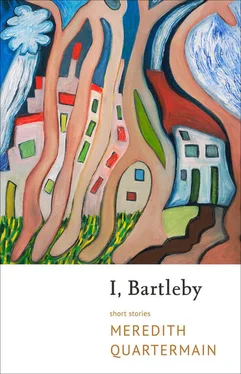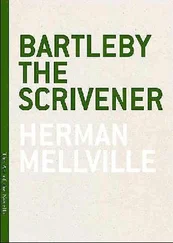My father was even more intriguing, and with him I could pinch and poke as much as I liked. I could get him to take me to the St. Lawrence Market, where we might buy some pumpernickel, salami, olives, halvah or pickled herring, or a braided loaf of egg bread. Or we’d go to the park and feed peanuts to squirrels. I’d watch him pee behind a tree when no one was looking, then try to pee like he did standing up, but I guessed it was something I’d have to learn when I was older. Sometimes he’d take me to his sign shop where I built forts out of packing cases and nests out of shredded wood called excelsior. I could watch him stir buckets of white fuzzy fluff into vats of syrupy resin, or turn the clear stuff white and pour it into moulds of letters held together in their backward shapes by nuts and bolts. I could stir and bolt things myself till he told me to buzz off and not let Fred catch me in here. It was Fred’s shop and buzz off was part of the father language Fred spoke with Dad, whom he called Gord, not his full name, Gordon. A language of half-sentences and grunts. Yep. Dunno. Shit. Chrissakes. Haveta cast again. By tomorrow, okay?
Out of their moulds, the letters leapt up off their sheet-metal plateau like little fortresses. Making them is what fathers did, making signs. To be important to fathers you had to be a letter, or a sign for the Royal Bank of Canada.
Perhaps that’s why he wrote so much himself, using the new ballpoint pens on yellow newsprint that fountain pens would have blotched and blotted — after he no longer worked for Fred, or for the Catholic mission, or in the government art-therapy program, or on the dam construction, or the high-rise development. Filling up sheet after sheet of yellow copy paper in loose cursive script — sheets filed in folders, folders of yellow sheets stored in filing cabinets, boxes of folders of yellow sheets under beds or collecting mildew in the basement. Line after line of handwriting from one side of the page to the other. About ignorant bosses and government corruption; about his failed lawsuit against the Catholic mission; about his need for affirmation and Maslow’s theories of self-actualization; about his mother’s dominance that’d twisted him; about women trying to be men and men who were pansies; about Mom’s bourgeois attitudes; about capitalist exploitation of workers; about the manipulators and frauds chiselling him out of an investment deal he’d been the one to think of. While Mom went to work and bought the house and clothes and groceries and financed his travels. Because in the father language that was what women were meant to do, so that fathers could get on with the important business of fathering.
When I was thirty, I no longer wanted to be a sign in that father language, or even a letter. I stopped speaking to him, stopped sending him birthday cards and Christmas presents, stopped inviting him for dinner, didn’t invite him to my wedding. I never forgave him for treating Mom like she was a neurotic, incompetent child. He telephoned once and said he took the blame for what happened. We don’t speak the same language, I said, Nothing we can share without that. He died in my silence. And it is here that I write of almond cakes.

When Dad brought his girlfriend home for the weekend, Mom told him to move out. She quit weeping, quit going without dinner, quit hiding in the spare room. Like fourteenth-century Christine de Pizan, Mom stopped cowering like a beaten dog. She got on with being the man she already was, the man for whom there was no word in the father language, the pretend man instead of the real woman the real man wanted her to be.
She took charge of her life, she transformed, she became human. Human and exile. Human and bitch. Human and refugee. I wish Mom had read then of Christine de Pizan. Read how de Pizan, alone with three children, grew muscles on her arms and legs while her voice dropped and her heart turned bold and hard. She repaired the wrecked ship of her life and took the helm. She became a true man, and after thirteen years as one, she planned never again to be lodged in a woman’s body.
She built a desk in her bedroom, mixed ink from oak apples, green vitriol and gum, sharpened her quills. She kept a sandbox and a mirror at hand and turned to Boethius, Boccaccio, and Dante. She wrote ballads and rondeaux de faisant étrange . I, Christine, she wrote, in the way of letters from court, monarch of her own speaking. She wrote a biography of Charles V, and books of political philosophy to save France from the Armagnacs and the Burgundians. She wrote for women, of women.
If men forever tell us, de Pizan wrote, that we’re nothing but quarrelsome nags, nothing but cruel and shrewish; that we’re mere gossips, slanderers, and lechers, filled with so much lust it would put any man’s to shame; that we’re lazy, evil, wicked, and foolish; that our sting has more venom than a snake; that we’re monsters, we start wars, and we’re the root of all evil and madness; that on Judgment Day, since our souls cannot be saved and our sex is full of venom, the whole of it and us will disappear into nothingness; if to love us is merely a game of deceit to capture shameless whores; if in business and law courts we’re not welcome and just fair game for cheating, then we must build our own city where we can love each other. Oh, my ladies, she wrote, make liars of them all. Remember how they call you frail, unserious, and easily influenced but yet try hard to trick you, just as they lay traps for wild animals. Oh, my ladies, flee, flee, flee the foolish love they urge on you. Learn finance, estate management, and law.
Learn to skin a sheep, peeling back the woolly casing of belly, flanks, ribs till you hold a collapsed, eyeless body sack. Soak it in lime till it lets go the wool, then stretch it, scrape it, pare it, dust it with chalk and rub it with pumice. Dip your pen and write.
No matter how much learning a man might have, she wrote, he could not fully describe what I would wish to write — a work to embrace the infinite variety of Fortune’s blows, her myriad forces of change.
Ovid, too, had written of changes to bodies: Echo shrivelling to nothing for Narcissus. Io seeing her jaws and horns in a stream, unable to pray, only moo to her sisters, then at last, free of cow skin, able to feel again her fingers and toes and her speaking tongue. Daphne who would rather be a tree than give in to Apollo; Arethusa choosing to be a stream, saved from Alpheus. The daughters of Thebes, preferring Athena and their looms to Bacchus and drunkenness, turned into bats, their tales of Thisbe and Leucothoe become tiny squeaks.
Cyane blocked Pluto, who should have asked not taken Proserpina, then dissolved into her raped pool. Arachne, daring to tell how gods cheat mortal girls, saw her nose and ears fall off, her body shrink to a belly with fingers for legs. To stop a war, Scylla swore herself and fatherland to Minos, but he scorned her love and she cursed him with the Minotaur before her father tore her to shreds and she flew off as Ciris, the shearer. This is no time for tears Procne told her sister Philomela; Tereus had dragged her to a lonely hut, raped her, cut out her tongue, chained her there. They roasted his son, made him a feast for the rapist. When he called for the boy, Philomela spoke the only way she could, throwing his bloody head into the rapist’s lap. They flew off — a swallow and a nightingale chased by Tereus the hoopoe, his sword beak always jutting ahead of him.
Christine de Pizan built a city of women. No longer would girls be killed as Ligdus had ordered Telethusa to do with her daughters. She disobeyed, raising Iphis as a boy. Ligdus, who clearly never changed diapers, engaged Iphis to Ianthe; and Iphis loved her madly, girl for girl, but dreaded the wedding. Her mother and the goddess loved them both even more, and Iphis’s steps grew longer, her face less shiny and more angled, her hair shorter. She married her love and rejoiced.
Читать дальше













